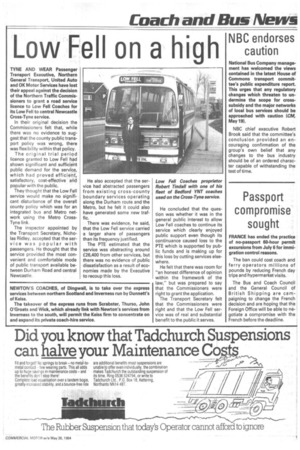Low Fell on a high NBCcaeuntdoonrses
Page 19

If you've noticed an error in this article please click here to report it so we can fix it.
TYNE AND WEAR Passenger Transport Executive, Northern General Transport, United Auto and OK Motor Services have lost their appeal against the decision of the Northern Traffic Commissioners to grant a road service licence to Low Fell Coaches for its Low Fell to central Newcastle Cross-Tyne service.
In their original decision the Commissioners felt that, while there was no evidence to suggest that the county public transport policy was wrong, there was flexibility within that policy.
The original trial period licence granted to Low Fell had shown significant and sufficient public demand for the service, which had proved efficient, satisfactory, cost-effective and popular with the public.
They thought that the Low Fell service would make no significant disturbance of the overall county policy which was for an integrated bus and Metro network using the Metro CrossTyne link.
The inspector appointed by the Transport Secretary, Nicholas Ridley, accepted that the service was popular with passengers. He thought that the service provided the most convenient and comfortable mode of public transport available between Durham Road and central Newcastle. He also accepted that the service had abstracted passengers from existing cross-county boundary services operating along the Durham route and the Metro, but he felt it could also have generated some new traffic.
There was evidence, he said, that the Low Fell service carried a larger share of passengers than its frequency justified.
The PTE estimated that the service was abstracting around £26,400 from other services, but there was no evidence of public dissatisfaction as a result of economies made by the Executive to recoup this loss. He concluded that the question was whether it was in the • general public interest to allow Low Fell coaches to continue its service which clearly enjoyed public support even though its continuance caused loss to the PTE which is supported by public funds and is making up for this loss by cutting services elsewhere.
He felt that there was room for "an honest difference of opinion within the framework of the law," but was prepared to say that the Commissioners were right to grant the application.
The Transport Secretary felt that the Commissioners were right and that the Low Fell service was of real and substantial benefit to the public it serves.








































































































